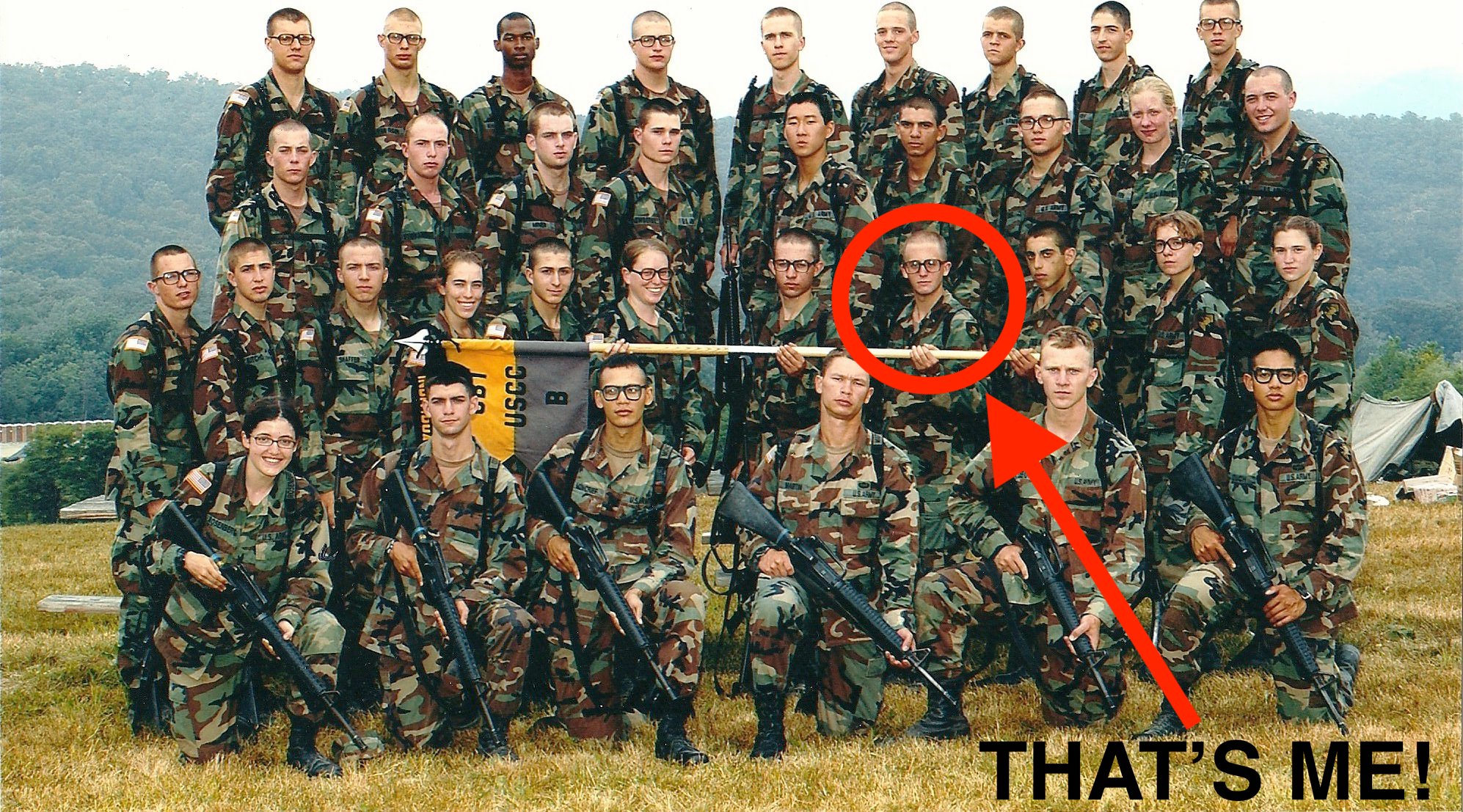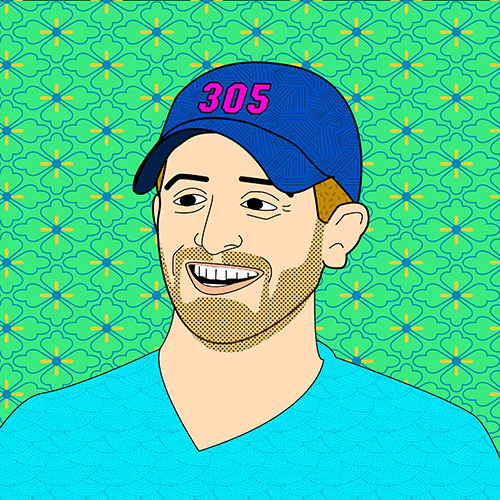“You’re not starving to death,” explained the 22-year-old medic gripping my ankle. “You’re just starving.”
He lanced a triple blister on my heel that had swelled to the size of a tennis ball after a 21-year-old kid styling himself a Cadet Captain decided that forcing 160 18-year-old-kids styling themselves New Cadets on a 15-mile march from Nowhere Upstate New York to Also Nowhere Upstate New York would somehow prepare them for a decade of warfare in the Iraqi dessert.
“I weighed 113 pounds at my last check-in!” I exclaimed, watching half a cup of clear fluid drain from my foot.
“Right, but some light starvation is pretty standard for Beast,” continued the medic nonchalantly, referring to West Point’s version of Army Basic Training. “I’d be much more concerned about serious ailments: fractures, snake bites, concussions, dysentery…”
“Dysentery!” I cried.
The medic applied a Moleskin patch to the raw, pink flap of skin covering a third of my foot.
“Yes, dysentery,” he said. “Last year’s entire class got it. They were in the field and it started raining. Some idiot New Cadet didn’t want to walk to the Port-a-John, so he took a shit outside his tent, that shit ran into his neighbors’ tents, and 1,200 people wound up shitting uncontrollably for the next two weeks. There!” he patted my heel. “Try to keep it dry.”
I stared.
“Dysentery’s nasty business,” he continued. “You can die of dehydration if you don’t pay attention.”
“You can die of starvation! And I want someone to pay attention!”
“You’re not going to die of starvation,” he tisked. “There’d be telltale signs. Your immune system would crash and you’d be sick all the time…”
“I AM sick all the time!” I coughed. “I went to the first aid tent, but the nurse just gave me a bottle of codeine.”
I gingerly slipped my sock and combat boot back onto my foot.
“Everyone’s sick,” grunted the medic as he slung his ruck onto his back. “You’re packed in unsanitary conditions. It’s crazy what so much stress does to the human body. Tons of your classmates didn’t take their first shits until they were in the field two weeks after R-Day. You’re fine. Walk it off.”
I hobbled back to my platoon.
Everything above is absolutely true, even if the conversation is completely fabricated. The triple blister, the medic, the codeine, the constipation, the dysentery, the Army doctors tape measuring me once a week because I was starving (not that they ever prescribed anything as medically groundbreaking as more food)—it all happened.
I spent two years at West Point and all I got from it were at least two undiagnosed concussions, a broken shin, hearing loss, and an associate’s degree in military acronyms. Oh, and the nightmares. Nightmares on such a tight nightly timetable they could set a Japanese train schedule.
But this piece isn’t about the nightmares. I already wrote that essay. It’s introspective, and it’s sad, and it’s really hard to laugh about, and I want to laugh. Specifically, I want to laugh about Beast: a seven-week hazefest that serves the introductory course to West Point’s four-year hazefest, after which newly minted Army Second Lieutenants receive a bachelor’s degree and a deployment notice.
The Decision
Occasionally, people who don’t know the difference between the Army and Navy, will forthrightly declare that I knew what I was getting into when I went to West Point, so they’d really appreciate if I could kindly shut up and stop hovering over their table ranting about my time on the Hudson as they try to have a nice anniversary dinner with their partner of 25 years. My preferred reasoned, level-headed response to this statement usually runs something like: “None of that shit was in the brochure!!!! And try the salmon!!!! It’s excellent!!!”
None of that shit was in the brochure. Unless you happened to be prior service or attended the U.S. Military Academy Preparatory School, you really had no idea what you were in for. I knew it would be challenging. I just didn’t know I’d be starved, though—ostensibly—not to death.
So why choose West Point? I thought quite hard about this question and, after 20 years of deep introspection, came to the counterintuitively obvious conclusion that I have no idea. You still want an answer, don’t you? Fine.
The best reason I’ve been able to concoct is that I have a deep-seated, pathological need to seek out and attempt difficult things. That’s why I removed more than 30,000 pounds of trash from Miami’s mangroves. It’s why I biked 114 miles around Lake Okeechobee in a day. It’s why I fought Godfrey in Elden Ring. West Point happened to be the hardest university I could think of, so I decided to give it a go.
Not that they made it easy. First, I had to complete the longest college application process in the United States—all in black ballpoint pen. There was the standard biographical section, the essays, the transcripts, etc. Then I had to finish a completely different application to receive a nomination from a member of Congress. No nomination meant no attendance. Luckily, I had strategically enrolled in an internship at Ileana Ros-Lehtinen’s district office, where I pretended and failed to be even remotely productive while earnestly attempting and repeatedly failing to make a decent cup of Cuban coffee.
I also had to pass a battery of physical, medical, psychological, and optical tests. This last one was an unexpected doozy because, when West Point perfunctorily declared I was too color blind to attend, I had to acquire a waiver stating I was just the right amount of color blind to attend. Then they announced (this really happened) with no supporting evidence that I was cross-eyed, so another ophthalmologist looked deeply into my eyes and declared they were not crossed after all, but rather striking and majestic. Then, finally, after the reviewing panel of crack Army doctors ran out of unfounded objections, they sent me an acceptance letter.
R-Day
Let’s get into it. June 27, 2005: Reception Day, also known as R-Day. The kickoff jamboree to West Point’s Basic Training program.
I flew alone from my hometown of Miami to Newark, New Jersey the previous day. Parents were allowed to attend, but I asked mine to stay home because I was a MAN. A real MAN! And I didn’t want to risk my parent’s presence setting off the crying, sadness, and other emotions ALL REAL MEN haven’t the slightest clue how to handle.
Anyway, I don’t remember much about that day other than the stunning I-95 vista from my Newark Airport Hilton suite, where I and several dozen other nervous 18-year-olds were put up for the night. The following morning, we met at the dining room for a predawn continental breakfast, where no one spoke. The tension was palpable, drawn tighter than the skin of a drum. An upperclassman in civilian clothes pierced it with a caustic laugh.
“You better get the talking out of your systems now!” he jeered. “You won’t be able to do it for the next two months!”
A fitting portent.
Suffocating silence descended back onto us like a blanket.
We piled into Greyhound buses for the drive up a Hudson Valley in full, lush summer regalia. After two mute hours, we passed through Thayer Gate, a stone neo-gothic two-story tower guarding passage into the United States Military Academy from Highland Falls, a tiny village clustered just outside West Point’s walls.
The campus was gorgeous, perched on a ridge hundreds of feet above the Hudson. Thick oak and pine forest covered the hills on both banks of one of North America’s great rivers—half a mile across, even at one of its most narrow points. Set in this carpet of greenery, West Point’s crenellated granite buildings made it look like an enormous fortress transported from the High Middle Ages.
We were deposited at Eisenhower Hall, an auditorium with more than enough seats to accommodate the entire 4,000-person Corps of Cadets. Little nervous clutches of my future classmates congregated with their parents throughout the cavernous theater. I sat alone with the one duffle bag of personal items I was allowed to bring.
A full-bird Colonel in crisp olive uniform strode onstage and delivered a curt speech about how the parents should be proud that their sons and daughters were about to join a long, distinguished legacy of young people who chose to serve their country. Then he unceremoniously uttered the infamous words: “You have 90 seconds to say goodbye.”
Children and parents bolted from their seats in surprise to exchange quick embraces and words of encouragement. Dozens of cadre marched into the hall in white short-sleeve shirts, gray pants, white gloves, and black shoes polished to a mirror gloss. White caps with black visors angled low over their eyes gave them a menacing appearance. These were the upperclassmen who would mold, shape, and beat us into proper Cadets over the next seven weeks.
I grabbed my bag and walked down to the aisle to the bottom of the theater, where the cadre formed us into a line snaking out a double door to the right of the stage.
“Don’t you fucking talk,” they hissed menacingly. “Cup your fucking hands. Eyes front, New Cadet Candidate. You’re mine. Mommy can’t help you now.”
“Well, fuck,” I thought to myself. “If this is happening before we’re even out of the parents’ sight, what’s in store later?”
I soon found out.
On the other side of the doors, the yelling began.
“Hurry up! March with a purpose, New Cadet Candidate! Move! Move now, you useless piece of shit!”
I ran down a corridor, flanked and chased by cadre until I burst into an open room with foldout tables. More cadre yelled at me to put my name and address on a tag that I slipped onto my bag’s handle. Aún más yelling until I was driven to a loading dock behind the theater where I was packed into a formation sardines would’ve found familiar, shoulder to shoulder, with hundreds of panting, perspiring classmates, mere inches from those in front and behind me.
We were herded onto a school bus where a Cadet declared we would sit in complete silence for the entire drive and God help us if we shifted our eyes even once from the back of the seat before us. You’d better fucking believe my eyes didn’t budge from a two-inch-diameter spot in that cracked brown seat covering.
More yelling and we got off the bus. Now the real fun began.
I was deposited at Thayer Hall, a multi-story building built into a cliff overlooking the river. This was where I’d later take my world history and composition courses. For R-Day, it had been transformed into a Hieronymus Bosch painting. The cacophony of yelling and insults rose to a continuous, high-pitched wail. Everywhere, panicked New Cadets burdened with 100 pounds of gear ran from pursuing cadre, like sinners chased by demons through Hell’s nine circles. Someone sprinted past, excrement sliding down their legs, the inevitable result of terror overtaking their temerity to ask permission to use the bathroom.
I was driven into a classroom where I signed a piece of paper that turned out to be a loyalty oath to uphold and defend the U.S. Constitution. I held up my hand and recited the pledge in front of the Stars and Stripes before emerging back into bedlam. I didn’t have the chance to celebrate my promotion from New Cadet Candidate to New Cadet before stumbling into another auditorium, this one much smaller than Eisenhower Hall, but large enough to hold 50 jumpy males. A Cadet commanded us to strip off all our clothes and bend over. We glanced at each other, wide-eyed and nervous. Sensing our hesitation, he screamed, “Now!”
We did as ordered and cadre inspected us with little snickers. This maneuver was supposedly designed to check for unauthorized tattoos, but I later learned it was just another dehumanization tactic. We then donned our patently ridiculous R-Day uniforms: white shirts tucked into black athletic shorts, two-quart canteens slung across the chest, black dress socks, and black dress shoes. In another room, I was directed to remove my contact lenses, which were replaced with what were decorously termed birth control glasses (BCGs), the jest being that anyone who wore the eyewear would never get laid.
The next hour was a blur of non-stop verbal abuse. I was chased into room after room where everything I needed for the duration of Beast—helmet, uniforms, flak vest, hygiene items, boots, gas mask—was piled into my new rucksack, flight bag, and big blue laundry bag. I slung the first onto my back, while the other two hung off my shoulders by one strap apiece. In my left hand, I held my personal bag. My arms went numb as circulation cut off, but I dared not shift my weight or adjust the straps while standing against the hallway wall, begging not to be noticed by the prowling cadre. Somewhere behind me, someone vomited. When we moved again, I barely had the presence of mind to sidestep a pool of urine. Over the loudspeaker came the blaring announcement that the first New Cadet had quit. The cadre cheered.
We were marched to the barbershop, where the barber made some joke about what kind of cut I’d like before guffawing and shaving me bald. Watching the hair fall in clumps to the floor, I realized I was transitioning from one phase of my life to another, that I’d never be the same.
Once I collected all my gear, I was led to a plaza ringed on four sides by gray, stone-fronted barracks rising six floors. In the late morning heat radiating off the asphalt, I and an impromptu squad of nine other New Cadets were taught how to salute, stand at attention and parade rest, right, left, and about-face, and march in formation. One poor soul marched in a stupor straight out the plaza and several miles down the road. He wasn’t stopped until he reached Thayer Gate, where he officially quit.
Throughout the day, between and often during bouts of yelling, I had been pummeled with the importance of paying attention to detail. Any derivation from strict instructions would elicit swift and merciless beratement. This culminated in reporting to the Cadet in the Red Sash.
“Step up to my line! Do not step on my line! Do not step over my line! Do not step behind my line! Step up to my line!”
I about-faced, walked up to a Cadet dressed exactly like my other tormentors apart from the bright red sash around his waist, and stepped on a line marked out in masking tape.
“Wrong, New Cadet!” he barked. “I said step up to my line! Not on my line, not before my line, and not over my line! About-face and do it again!”
I walked back to my previous spot ten feet away.
“Step up to my line! Do not step on my line! Do not step over my line! Do not step behind my line! Step up to my line!”
I approached him again, making sure not to step on or over the line.
“Place your bag down!”
I dropped my bag.
“Wrong, New Cadet!” he yelled. “I said place your bag down, not drop it! Do it again!”
Another go around, this time I walked up to the line and placed my bag down. I saluted and exclaimed, “Sir, New Cadet Otazo reports to the Cadet in the Red Sash for the first time as ordered, Sir!”
He narrowed his eyes.
“Wrong again, New Cadet! This is the Army, not the Marines! We do not hand out sir sandwiches! You only say ‘Sir’ once! And is this your first time reporting to the Cadet in the Red Sash?”
I hesitated.
“It isn’t, New Cadet! Do you not know how to count? It is the third time! Do it again!”
Fourth time was a charm. I walked up to the line, placed my bag down, saluted, and said, “Sir, New Cadet Otazo reports to the Cadet in the Red Sash for the fourth time as ordered!”
He saluted back.
“Carry on!” he cried before the next victim approached. It was my first tiny victory since passing Thayer Gate and I got off better than most. Many other New Cadets were forced to report to the Cadet in the Red Sash upward of 10 times before he finally lost patience and shuffled them on.
Next up was lunch. I was led into the Dining Hall whose high pointed arches buttressing a 60-foot-high ceiling and enormous stained glass windows gave its interior the appearance of a militant Salisbury Cathedral. I sat at a wooden table with eight other New Cadets. At its head, a Cadet Sergeant gave us an empathetic look.
“Look, New Cadets,” he said. “Don’t worry about military etiquette or hazing right now. Just eat. This’ll be your last normal meal for the rest of Beast.”
I’ll never forget the dry turkey wrap and even more dry rolled pretzels I washed down with orange Powerade before rushing to my barracks room.
Intermission (Jerry Jones)
God bless Jerry Jones, my roommate for the duration of Beast. I’d never met a 6’2” Black football player from Baltimore. He’d certainly never met a diminutive Cuban American from Miami. So, at least we had that in common.
My squad leader, a rising Junior (or Cow, in West Point parlance), primary instructor and tormentor for the first half of Beast, deposited me at the door of a room eight feet across by 15 feet long. At the far corners, beside windows overlooking the asphalt plaza three stories below, stood two L-shaped desks with shelves on the walls above them. Then came a pair of steel-framed beds with thin, ancient mattresses. On the right side was a sink with two medicine cabinets set above and two laundry bins below the Formica countertop. At the foot of the left hand bed were two chin-high cabinets facing two wooden, double-doored, built-in closets.
“New Cadet Jones!” yelled my squad leader. Jerry spun around and stood at parade rest.
“This is your new roommate, Jones!” He gave me a sideways glance. “Square him away! He’s all sorts of jacked up.”
“Yes, Sergeant!” responded Jerry.
When the squad leader left the room, I began to sputter, “Sergeant, New Cadet Otazo reporting for…”
“Whoa, whoa, relax,” interjected Jerry. He stepped toward me with outraised hands. “I’m a New Cadet, like you. You don’t need to do any of that. Come on. Put your stuff down. Let’s square you away.”
God bless Jerry Jones.
He had previously attended West Point’s Preparatory School, which was basically a dry run for Beast and everything else the United States Military Academy would throw at us. He taught me how to fold my socks, shine my shoes and belt buckle, tuck hospital corners into my bed, and generally dealt with my perennial New Cadet sense of panic.
Seriously, God bless Jerry Jones.
Jerry helped me assemble my uniform composed of gray slacks, white short-sleeved shirt, dress shoes, white cap, and white gloves (I thankfully never wore my ridiculous R-Day uniform again) before the squad leader shouted for us to, “Get on my wall!”
Out we scrambled to the wall across the hallway and stood at parade rest with our new squadmates, the eight other souls with whom we’d spend the rest of Beast.
R-Day (cont.)
The cadre jostled us into rough company formations before marching us out of the barracks half a mile to Battle Monument, a freestanding stone pillar with an incredible view of a great curve in the Hudson River. We once more repeated our Oath of Loyalty while the parents—safely cordoned off on bleachers—gaped in what I suppose was no small sense of shock when they saw their bespectacled, shaved, uniformed, fidgety children. I wouldn’t know, though. My genetically preordained Latino height meant I couldn’t see shit other than the towering, corn-fed, All-American, Midwestern good ol’ boy descendants of Vikings surrounding me on all sides. Back at the barracks, I removed my shoes and took stock of the blisters that had turned my feet into pulsating bags of pus.
I assume we had our faces hazed off during dinner, though the last thing I remember was being shoved into the male communal showers at the end of the day. The locker room smelled of mold, and feet, and fear-induced body odor.
“Take off your clothes! Get in the showers!” cried the cadre, already stripped nude.
“Fuck it,” I thought. “I already got naked once around these guys. What’s one more time?”
But this was no normal bathroom. A dozen showerheads set in a tiled enclosure with no curtains or other totems of privacy were somehow supposed to service a platoon of 40.
“Double up!” cried a Cadet Sergeant.
Two New Cadets took turns around each showerhead. With yet more waiting, unwashed bodies, someone yelled “Triple up!” and three of us crowded around each stream, two on either side and one in front, doing our level best not to make eye contact. Later during Beast, I heard but did not personally participate in a “Quadruple up!”
I must’ve caught some scrap of furtive sleep that night before being roused at 5 in the morning by my squad leader roaring, “Wake up, New Cadets! Get on my wall in PT uniform, teeth brushed, beds made, rooms squared away in 10 minutes!”
Jerry explained that PT (physical training) uniform was composed of a gray T-shirt, black shorts, white socks, and running shoes. Upon scrambling out the door we, along with everyone else in the squad, were late.
The squad leader made us do pushups until the last straggler arrived. Then we did more pushups for “unit cohesion.” He led us to the asphalt apron that bordered the open expanse of the parade field, where the newly minted Class of 2009 had assembled into eight company formations. The sun had not yet risen as a driving rain pummeled my body and pinged off my BCGs. For the first time, I wondered what the hell I’d gotten myself into.
“That’s liquid character falling from the sky!” beamed our squad leader as he walked down the line, making corrections. “Soak in the character!”
. . . . .
This is the first of a five-part series of essays recounting my experience during West Point’s Cadet Basic Training. The other articles will be published in subsequent weeks.
If you like our stories, check out The Miami Creation Myth hardcover.




